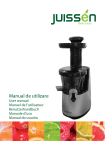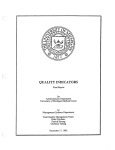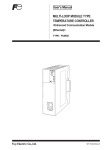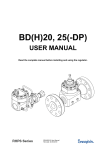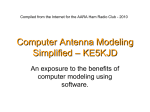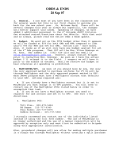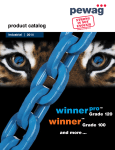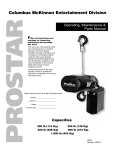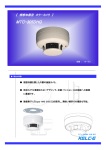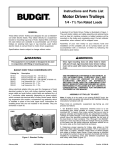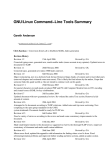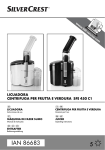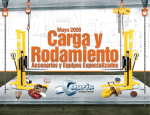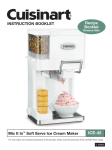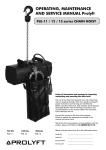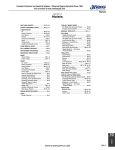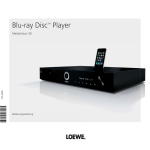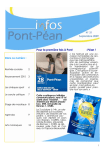Download UNIVERSAL TROLLEY - Columbus McKinnon
Transcript
OPERATING, MAINTENANCE & PARTS MANUAL MOTOR-DRIVEN TROLLEY UNIVERSAL TROLLEY MOTORIZED TM Before using the trolley, fill in the information below. Refer to the trolley identification plate. Model Number Serial No. Purchase Date Voltage Rated Load RATED LOADS 1 TO 3 TONNES Follow all instructions and warnings for inspecting, maintaining and operating this trolley. The use of any hoist and trolley presents some risk of personal injury or property damage. That risk is greatly increased if proper instructions and warnings are not followed. Before using this trolley, each operator should become thoroughly familiar with all warnings, instructions and recommendations in this manual. Retain this manual for future reference and use. Forward this manual to the trolley operator. Failure to operate equipment as directed in manual may cause injury. Manual Number: 33339403_150579 (REV AA) June 2015 CM HOIST PARTS AND SERVICES ARE AVAILABLE IN THE UNITED STATES AND IN CANADA As a CM user, you are assured of reliable repair and parts services through a network of Master Parts Depots and Service Centers that are strategically located in the United States and Canada. These facilities have been selected on the basis of their demonstrated ability to handle all parts and repair requirements promptly and efficiently. Below is a list of the Master Parts Depots in the United States and Canada. To quickly obtain the name of the U.S. Service Center located nearest you, call (800) 888-0985. Fax: (716) 689-5644. In the following list, the Canadian Service Centers are indicated. UNITED STATES MASTER PARTS DEPOT CANADIAN SERVICE CENTERS CALIFORNIA NORTH CAROLINA ALBERTA or OHIO **COLUMBUS McKINNON, LTD. 10311-174th Street Edmonton, Alberta T5S 1H1 800/263-1997 Fax 403/486-6160 OTTO SYSTEMS, INC. 12010 Bloomfield Ave. Sante Fe Springs, CA 90670 562/462-1612 or 800/596-7392 Fax 562/462-1617 7656 Las Positas Road Livemore, CA 94551 925/245-8800 Fax 925/245-8804 GEORGIA TEAM SESCO 2225 Freedom Drive Charlotte, NC 28208 704/372-4832 or 800/487-3726 Fax 704/358-1098 MAZZELLA LIFTING TECHNOLOGIES 21000 Aerospace Parkway Cleveland, OH 44142 440/239-5700 or 800/362-4601 Fax 440/239-5707 ACE INDUSTRIES, INC. 6295 McDonough Drive Norcross, GA 30093 770/441-0898 or 800/733-2231 Fax 800/628-3648 PENNSYLVANIA INDIANA RAM MOTORS & CONTROLS, INC. 5460-B Pottsville Pike Leesport, PA 19533 610/916-8000 or 877/916-8018 Fax 610/916-7957 HORNER ELECTRIC COMPANY, INC. 1521 East Washington Street Indianapolis, IN 46201 317/639-4261 Fax 317/639-4342 IOWA VMI HOIST & CRANE SERVICES 901 17th Street NE Cedar Rapids, IA 52406 319/365-4662 Fax 319/365-8075 KANSAS INDEPENDENT ELECTRIC MACHINERY 4425 Oliver Street Kansas City, KS 66106 913/362-1155 Fax 913/904-3330 LOUISIANA BEERMAN PRECISION, INC. 4206 Howard Ave. New Orleans, LA 70125 504/486-9391 Fax 504/486-7482 AMICK ASSOCIATES, INC. 11 Sycamore Street Carnegie, PA 15106-0529 412/429-1212 or 800/445-9456 Fax 412/429-0191 TEXAS ABEL EQUIPMENT CO., INC. 3710 Cavalier Drive Garland, TX 75042 972/272-7706 Fax 972/272-6955 HYDRAULIC EQUIPMENT SERVICES, INC. 1021 North San Jacinto Street Houston, TX 77002 713/228-9601 Fax 713/228-0931 WISCONSIN TRESTER HOIST & EQUIPMENT, INC. W136 N4863 Campbell Drive Menomonee Falls, WI 53051 262/790-0700 or 800/234-6098 Fax 262/790-1009 BENNETT & EMMOTT, LTD. 18131 118th Avenue Edmonton, Alberta T5S 1M8 403/454-9000 Fax 403/454-8990 BRITISH COLUMBIA FLECK BROTHERS, LTD. 4084 McConnel Court Burnaby, British Columbia V5A 3N7 MANITOBA KING’S ELECTRIC MOTORS, INC. 633 Tyne Avenue Winnipeg, Manitoba R2L 1J5 204/663-5332 Fax 204/663-4059 NOVA SCOTIA *W & A MOIR 95 Ilsley Ave. Burnside Park, Nova Scotia B3B 1L5 902/468-7720 Fax 902/468-3777 ONTARIO *R & W HOIST REPAIR, LTD. 790 Redwood Square Units 5, 6, & 7 Oakville, Ontario L6L 6N3 905/825-5500 Fax 905/825-5315 *TORONTO ELECTRIC HOIST SALES & SERVICE 9 CoDeco Court North York, Ontario M3A 1A1 416/386-0820 Fax 416/386-0821 *MASLACK SUPPLY, LTD. 488 Falconbridge Road Sudbury, Ontario P3A 4S4 705/566-1270 Fax 705/566-4208 MASSACHUSETTS ABEL DISTRIBUTORS, INC. 50 Parker Street, Unit 2 Newburyport, MA 01950 978/463-0700 Fax 978/463-5200 *COLUMBUS McKINNON, LTD. P.O. Box 1106 10 Brook Road, North Cobourg, Ontario K9A 4W5 905/372-0153 Fax 905/372-3078 NEW JERSEY SHUPPER-BRICKLE EQUIPMENT CO. 2394 Route 130, Suite C Dayton, NJ 08810 732/438-3888 Fax 732/438-3889 QUEBEC *HERCULES SLING & CABLE 3800 TransCanada Highway Pointe-Claire, Quebec H9R 1B1 514/428-5511514/48631-5511 Fax 514/428-5555 NEW YORK VOLLAND ELECTRIC EQUIPMENT CO. 75 Innsbruck Drive Buffalo, NY 14227 716/656-9900 Fax 716/656-8898/8899 *LEGER PALANS ET OUTILLAGES, INC. 7995-17th Ave. Montreal, Quebec H1Z 3R2 514/376-3050 Fax 514/376-0657 *ARE ALSO MASTER PARTS DEPOTS **MASTER PARTS DEPOT ONLY i Manual Number: 33339403_150579 (REV AA) June 2015 OPERATING AND SAFETY PROCEDURES SAFETY PRECAUTIONS Each Universal Motor-Driven Trolley is built in accordance with the specifications contained herein and at the time of manufacture complied with our interpretation of applicable sections of the *American Society of Mechanical Engineers Code B30.11 “Monorail Systems and Underhung Cranes,” the National Electrical Code (ANSI/NFPA 70) and the Occupational Safety and Health Act. Since OSHA states the National Electrical Code applies to all electrical installations and utilization equipment, installers are required to provide current overload protection and grounding in keeping with the code. Check each installation for compliance with the application, operation and maintenance sections of these articles. Improper operation of a trolley can create a potentially hazardous situation which, if not avoided, could result in death or serious injury. To avoid such a potentially hazardous situation, the operator shall follow these operating and safety procedures. The following are operating and safety procedures for safe operation of the Universal Motor-Driven Trolley. Taking precedence over any specific rules listed here, however, is the most important rule of all, USE COMMON SENSE. A few minutes spent reading these rules can make an operator aware of dangerous practices to avoid and precautions to take for his own safety and the safety of others. Frequent examinations and periodic inspections of the equipment as well as a conscientious observance of safety rules may save lives as well as time and money. After you have completely familiarized yourself with the contents of this manual, we recommend that you carefully file it for future reference. *Copies of this standard can be obtained from ASME Order Department, 22 Law Drive, Box 2300, Fairfield, NJ 07007-2300, U.S.A. 1. Immediately after installation, operate trolley (according to the Operating and Safety Procedures as follows) with 100% load over the entire length of runway or monorail system to be sure that all adjustments and operations are satisfactory. HIS SYMBOL POINTS OUT IMPORTANT SAFETY T INSTRUCTIONS WHICH IF NOT FOLLOWED COULD ENDANGER THE PERSONAL SAFETY AND/OR PROPERTY OF YOURSELF AND OTHERS. READ AND FOLLOW ALL INSTRUCTIONS IN THIS MANUAL AND ANY PROVIDED WITH THE EQUIPMENT BEFORE ATTEMPTING TO OPERATE YOUR UNIVERSAL MOTOR-DRIVEN TROLLEY. 2. Rail stops must be installed for all trolleys operating on open end beams. These stops must be positioned such that impact forces are absorbed by the trolley sideplates only. 3. When preparing to lift a load, be sure that the attachments to the hook are firmly seated in hook saddle. Avoid off-center loading of any kind, especially loading on the point of hook. 4. When lifting, raise the load only enough to clear the floor or support and check to be sure that the attachments to hook and load are firmly seated. Continue lift only after you are assured the load is free of all obstructions. 5. When applying a load, it should be directly under the trolley. Avoid off-center loading of any kind. 6. Take up a slack load chain carefully and start lifting load slowly to avoid shock and jerking of hoist load chain. If there is any evidence of overloading, immediately lower the load and remove the excess load. 7. DO NOT allow the load to swing or twist while hoisting. 8. Anticipate the stopping point and allow trolley to coast to a smooth stop. Reversing or “plugging” to stop trolley causes overheating of motor and swaying of load. 9. DO NOT load trolley beyond the rated capacity. Overload can cause immediate failure of load carrying parts or cause damage resulting in future failure at less than rated capacity. 10.DO NOT use this or any other overhead materials handling equipment for lifting or transporting people. 11.Stand clear of all loads and avoid moving a load over the heads of other people. Warn people of your intention to move a load in their area. 12.DO NOT leave the load suspended in the air unattended. 13.DO NOT wrap the load chain around the load and hook onto itself as a choker chain. Doing this will result in the following: a. Operation of the upper limit switch is bypassed and the load could hit the hoist. b. The loss of the swivel effect of the hook which could mean twisted chain and a jammed liftwheel c. The chain could be damaged at the hook. 14.Permit only qualified personnel to operate unit. ii Manual Number: 33339403_150579 (REV AA) June 2015 NOTES iii Manual Number: 33339403_150579 (REV AA) June 2015 FOREWORD This manual contains important information to help you properly install, operate and maintain the Universal Motor-Driven Trolley for maximum performance, economy and safety. Please study its contents thoroughly before putting your trolley into operation. By practicing correct operating procedures and by carrying out the recommended preventive maintenance suggestions, you will experience long, dependable and safe service. After you have completely familiarized yourself with the contents of this manual, we recommend that you carefully file it for future reference. TABLE OF CONTENTS LIST OF TABLES SAFETY PRECAUTIONS Operating and Safety Procedures�������������������������������������������������������ii Foreword�������������������������������������������������������������������������������������������� 1 GENERAL INFORMATION Table Title Universal Motor-Driven Trolley Specifications������������������ 3 1 Page LIST OF ILLUSTRATIONS Layout������������������������������������������������������������������������������������������������� 2 Specifications������������������������������������������������������������������������������������� 3 Figure Table CM Repair/Replacement Policy��������������������������������������������������������� 3 INSTALLATION Unpacking Information����������������������������������������������������������������������� 3 Suspension Kit to Hoist���������������������������������������������������������������������� 3 Page 1 Hoist and Trolley General Arrangement���������������������������� 4 2 Hoist and Trolley General Arrangement���������������������������� 4 3 Strain Relief Details����������������������������������������������������������� 5 Hoist to Trolley������������������������������������������������������������������������������������ 3 Hoist / Trolley to Beam����������������������������������������������������������������������� 3 Electrical Installation��������������������������������������������������������������������������� 4 Cord Layout���������������������������������������������������������������������������������������� 4 Input Power Cord������������������������������������������������������������������������������� 4 Trolley Motor Card������������������������������������������������������������������������������ 4 Control Station����������������������������������������������������������������������������������� 5 Hoist Power Cord������������������������������������������������������������������������������� 5 Strain Relief Details���������������������������������������������������������������������������� 5 Hoist Control Cord����������������������������������������������������������������������������� 6 Combination Power / Control Cord���������������������������������������������������� 6 Grounding the Enclosure�������������������������������������������������������������������� 6 Three-Phase Units������������������������������������������������������������������������������ 6 OPERATING INSTRUCTIONS General����������������������������������������������������������������������������������������������� 6 INSPECTION Procedures����������������������������������������������������������������������������������������� 6 MAINTENANCE General����������������������������������������������������������������������������������������������� 7 Optional Components������������������������������������������������������������������������ 7 TROUBLESHOOTING Electrical Data������������������������������������������������������������������������������������ 8 UTM Washer & Spacer Placement����������������������������������������������� 9–10 TROLLEY WASHER SPACING Ordering Instructions������������������������������������������������������������������������ 11 Control Station and Parts List���������������������������������������������������������� 12 Trolley Components and Parts List�������������������������������������������������� 13 Drive Assembly Components and Parts List�������������������������������14-15 Control Layout���������������������������������������������������������������������������������� 16 Enclosure Components and Parts List��������������������������������������� 17–18 Electric Hoist Suspension and Cord Kits����������������������������������������� 19 Wiring Diagrams������������������������������������������������������������������������� 20–22 1 Manual Number: 33339403_150579 (REV AA) June 2015 GENERAL LAYOUT As received, your trolley kit will be preassembled with the control assembly attached to the plain sideplate and the drive assembly attached to the geared sideplate. The push button and cable assembly and input power cord will be attached and wired to the control enclosure. The motor cord will be attached and wired to the motor. The suspension pins, washers and spacers will not be assembled to either sideplate. The installer will be required to set the trolley spacing according to the beam flange width the trolley is to be mounted. A cord kit will be needed to wire the hoist to the trolley. Some hoists use one combination cord for both power and control while other hoists use two separate cords for power and control. CONTROL ASSEMBLY DRIVE ASSEMBLY SUSPENSION PINS WITH HARDWARE 2 Manual Number: 33339403_150579 (REV AA) June 2015 GENERAL INFORMATION INSTALLATION SPECIFICATIONS UNPACKING INFORMATION The Universal Motor-Driven Trolley is designed for use with many CMCO Electric Chain Hoists. The trolleys are available in 1t, 2t and 3t capacities. They are similar in design except the size of the load carrying members. Available speeds are 15, 35 and 75 feet per minute. 75 fpm is not available for 3t capacity, however. After removing the trolley from the shipping carton, carefully inspect the external condition of the cords, control box, gear reducer and motor for damage that may have occurred during shipment and handling. Check to make sure all parts (trolley sideplate assembly with control enclosure, push button and cable assembly, input power cord, trolley sideplate with gear reducer and motor, motor cord, suspension pins, spacers, washers, cotter pins and nuts) are furnished. The trolleys have rugged steel sideplates, steel axles, steel suspension pins, steel load bracket from which the hoist is suspended and machined, forged steel wheels that are suitable for operation on sloped or flat-flanged beams. Hardened trackwheel gear teeth are driven by a right angle worm gear reducer. The worm and gear of the gear reducer operate in an oil bath. An IP55 motor drives the gear reducer. INSTALLATION The hoist and trolley are packed separately. The type of top suspension may vary per hoist model, therefore, the following installation steps will assume there is no top suspension assembled to the hoist. The control enclosure contains a reversing contactor, transformer and terminal blocks. There are three enclosures available based on supply voltages of 208v, 230v/460v and 575v. A four-button control station is suspended from the control enclosure. The up and down hoist control buttons are 2-step. Trolley control buttons are 1-step. Suspension Kit to Hoist Assemble the UT suspension kit to the hoist according to the instructions furnished with the suspension kit and/or the instructions in the manual furnished with the hoist. Make sure the suspension kit is installed based on the application, considering the hoist's reeving (single, double or triple) and mounting (parallel or cross) configurations. See Table 1 for general specifications of the trolley. CM REPAIR/REPLACEMENT POLICY All Columbus McKinnon (CM) Universal Motor-Driven Trolleys are inspected and performance tested prior to shipment. If any properly maintained trolley develops a performance problem within 1 (one) year of shipment due to a material or workmanship defect, as verified by CM, repair or replacement of the unit will be made to the original purchaser without charge. This repair/replacement policy applies only to trolleys installed, maintained and operated as outlined in this manual and specifically excludes parts subject to normal wear, abuse, improper installation, improper or inadequate maintenance, hostile environmental effects and unauthorized repairs/modifications. Hoist to Trolley It is recommended that the trolley be mounted to the hoist prior to final installation onto the beam. Follow the washer and spacer placement instructions (page 9 and 10) to properly set the trolley based on the application's beam flange width. The suspension pins must be offset toward the motor side for the UT1M and UT2M trolleys. It is recommended to do the same for the UT3M, but it is not required. Note: the motor-driven side of the trolley should be located on the same side as the hoist's chain container. We reserve the right to change materials or design if, in our opinion, such changes will improve our product. Abuse, repair by an unauthorized person or use of non-CM replacement parts voids the guarantee and could lead to dangerous operation. For full Terms of Sale, see Sales Order Acknowledgement. Also, refer to the back cover for Limitations of Warranties, Remedies and Damages, and indemnification and Safe Operation. TABLE 1 An excessively worn beam flange may fail and allow the trolley to fall from the beam. Universal Motor-Driven Trolley Specifications Code Capacity (Tonnes) Power Supply (ALL CODES) Travel Speed (FPM) UT1M* 1 208-3-60 15, 35, 75 UT2M* 2 UT3M* 3 230/460-3-60 15, 35, 75 575-3-60 Motor (HP) Flange Width (IN) TO AVOID INJURY: Periodically inspect the beam flange for wear. Replace beam if flange is worn. Min Radius Curve (IN) Hoist / Trolley to Beam After setting the trolley, install the hoist/trolley assembly onto the beam from the end. If this is not possible, loosen the suspension pin castle nuts so the trolley wheels clear the beam's flange. Lift the hoist/trolley assembly up and tighten the suspension pin castle nuts. Lower the hoist/ trolley assembly onto the beam's flange. Ensure rail stops are in place after the installation is complete. 36 1/3 15, 35 2.3-8.6 45 55 *15 = 15fpm, 35 = 35fpm, 75 = 75fpm; 3 = 230/460V, 5 = 575V, 7 = 208V; 0 = Type 0, 1 = Type 1. Example: UT1M3530 = UT1 base trolley, 35 fpm, 230/460V, Type 0. Operating the trolley on a beam that has no rail stops may allow the trolley to fall off the end of beam. TO AVOID INJURY: Install rail stops at each end of the beam on which the trolley is to operate. Rail stops must be positioned so as to not exert impact force on the hoist frame or trolley wheels. They must contact the ends of the trolley sideplates. The rubber bumper kit, purchased separately, should be considered if trolley to rail stop contact is frequent. 3 Manual Number: 33339403_150579 (REV AA) June 2015 INSTALLATION (CONTINUED) Electrical Installation Power to the trolley and hoist should be furnished from a compatible source through a disconnect device. Overcurrent protection and proper grounding means should be accomplished in accordance with the “National Electrical Code” and local codes if applicable. Power should be disconnected when making or changing connections. The input power cord and push button and cable assembly are attached and wired to the control enclosure from the factory. The motor cord is attached and wired to the motor from the factory. A cord kit is required to connect the hoist power and controls from the hoist to the control enclosure. The cord kit will include either one combination cord or two individual cords, depending on the hoist model. The combination cord contains conductors for both power and control connections. The two-cord kit includes a power cord and a separate control cord. Cord Layout See Figure 1. When viewing the assembly from the enclosure side, the input power cord is at the left end of the enclosure. A knockout plug is located directly below the input power cord. Knockout plugs are provided loose in the enclosure. An additional knockout is provided on the left end as well. The push button and cable assembly is attached to the bottom left end of the enclosure. See Figure 2. When viewing the assembly from the enclosure side, the trolley motor cord is at the right end of the enclosure. Note that the cord is routed through the unused suspension pin holes in the sideplates so the cord will not contact the beam. This particular hoist / trolley example requires a combination cord, providing both power and controls from the enclosure to the hoist. It is attached to the right end of the enclosure. An additional knockout is provided at the right end of the enclosure. Both ends of the enclosure have the same number of holes and knockouts. Figure 1. Hoist and Trolley General Arrangement Note: UT2M***0 trolley shown. Input Power Cord The input power cord is attached and wired to the enclosure. It is for use with a collector and bus system. It should be discarded if a cable is to supply the trolley. Connections to the trolley are shown on wiring diagrams, see pages 20, 21 and 22. The cord connector must be made tight on the cable, and if necessary, a separate strain relief provided to prevent any stress on the conductors. Trolley Motor Cord The trolley motor cord is attached and wired to the motor. Connections within the enclosure are shown on wiring diagrams, see pages 20, 21 and 22. The cord should be routed from the motor junction box through unused suspension pin holes in both sideplates to the control enclosure. This will keep the cord from being damaged by the beam. Figure 2. Hoist and Trolley General Arrangement 4 Manual Number: 33339403_150579 (REV AA) June 2015 Control Station The control station is suspended from the trolley control enclosure by a cord that is approximately 17' long. If this is too long for your application, the cord should be shortened so that the control station is suspended approximately four feet above the operating floor. A clamp and sleeve are provided loose in the control enclosure. Be sure to firmly squeeze the clamp sleeve using a vise or very large pliers to secure the loop end. Insulate the clamp using the rubber sleeve. Slide the prepared cord through the cord connector under the control enclosure. Using the wiring diagram supplied with the trolley, or see pages 20, 21 and 22 within this manual, connect the control cord conductors. Attach the strain relief loop over the mounting screw and washer. Pull down on the cord to seat the strain relief cord. Tighten the strain relief mounting screw. Firmly tighten the cord connector. Tying knots or loops to shorten the drop of the control station will make the strain relief ineffective and the internal conductors of the cord may break. Hoist Power Cord The hoist power cord, supplied within the cord kit, connects power from the control enclosure to the hoist. The hoist end of the cord will be configured just like a standard power cord for a specific hoist while the enclosure end will be stripped for inserting into the terminal blocks. TO AVOID INJURY: Shorten the control cord per the following instructions. To shorten the cord, disconnect the trolley from the power supply system and loosen the cord connector at the bottom of the control enclosure. Remove the cover from the control enclosure and disconnect the control cord conductors. Loosen, but do not remove, the strain relief mounting screw. Slightly push the cord inside the enclosure and unfasten the strain relief loop. Pull the cord out of the enclosure. Measuring from the end of the longest conductor, cut off the cord the distance the control is to be raised. Prepare the cable as shown below (Fig 3). STRAIN RELIEF DETAILS Color Lead Length Strip Length Label Condition Location Brown 12 Yellow 12 .35 UP Solder Dip 3 .35 DN Solder Dip 2 Blue 12 .35 HX1 Solder Dip 4 White 12 .35 FA Solder Dip 1 Purple 12 .35 TL Solder Dip REV CONT (L) Orange 12 .35 TR Solder Dip REV CONT (R) Red 12 .35 X1 Solder Dip 5 Black SEE STRAIN RELIEF DETAILS – Figure 3. Strain relief details. 5 Manual Number: 33339403_150579 (REV AA) June 2015 INSTALLATION (CONTINUED) OPERATING INSTRUCTIONS Hoist Control Cord The hoist control cord, supplied within the cord kit, connects the controls from the control enclosure to the hoist. The hoist end of the cord will be configured just like a standard control cord for a specific hoist while the enclosure end will be stripped for inserting into the terminal blocks. After the trolley and hook travel directions are correct, lubricate the geared wheel and driveshaft gear mesh with lubricant provided. Operate the trolley (according to the operating and safety procedures see page ii) with a capacity load over the entire length of he runway or monorail system to be sure that all adjustments and operations are satisfactory. Combination Power / Control Cord The combination cord is the cord kit. It connects both the power and controls from the control enclosure to the hoist. The hoist end of the cord will be configured just like a standard combination cord for a specific hoist while the enclosure end will be stripped for inserting into the terminal blocks. INSPECTION To maintain continuous and satisfactory operation, a regular periodic inspection procedure must be initiated so that worn or damaged parts can be replaced before they become unsafe. The frequency of inspection must be determined by the individual application. Grounding The Enclosure The enclosure frame has one ground wire attached to a green ground screw. The input power cord, motor cord, hoist power cord and the reversing contactor will be connected to the one ground wire using a wire cap. The wire cap is installed from the factory less the hoist power cord ground. The following list gives an inspection procedure for normal usage under normal conditions. When the unit is subjected to heavy usage or dusty, gritty, moist or other adverse atmospheric conditions, shorter time periods must be assigned. Inspection must be made of all parts for unusual wear, corrosion or damage in addition to those specifically mentioned in the list below. TEST AND ADJUSTMENTS FOR 3 PHASE MODELS It is suggested that the unit be inspected monthly for wear damage and corrosion effects to all parts with particular attention to the following: 1. Tightness of all fasteners including trackwheel stud nuts and suspension pin nuts. Three phase hoists must be properly phased each time they are installed or moved to a new power source. Unless this is done, serious damage to the hoist can occur with resulting hazard to the operator and load. 2. Contactor and control station for burnt or pitted contacts and loose or corroded terminals. 3. Cables and leads for broken wires, loose or corroded terminals, also damaged insulation. 1. To properly phase hoists follow these steps. a. Operate "UP" button briefly to determine direction of load hook travel. 4. Terminal blocks for loose or corroded connections. 5. Trackwheels for wear of tread and flange and for bearing wear as indicated by excessive looseness of wheel on stud. b. If load hook raises when "UP" button is pressed, phase is correct and hoist may be operated. c. If load hook lowers, hoist is "Reverse Phased" and must be corrected by interchanging any two leads at power source connection. Do not change internal wiring of hoist or trolley. 6. Trackwheel gear and pinion for wear. 7. Check suspension lug, suspension adapter and suspension shear pin for excess wear by manipulating hoist and visually inspecting suspension parts. 2. Check hoist upper and lower limit stop operation to determine if limit stop functions properly in both directions. Refer to hoist "Operation and Service Manual" under "Testing Hoist" for method to be followed. 8. Collector or power supply system for damage, wear corrosion and proper operation. 3. Position hoist/trolley combination on I-beam so that enough clear track is available to allow travel of trolley in two directions to permit checking "RIGHT" and "LEFT" traverse operation. Note: Three Phase Motors: If it is desired to reverse the direction of trolley travel in relation to the push button markings, turn POWER OFF and interchange any two leads at trolley motor cord / reversing contactor connection. 6 Manual Number: 33339403_150579 (REV AA) June 2015 MAINTENANCE Lubrication requirements: a. Wheel bearings are permanently lubricated and require no additional lubricant. b. Drive wheel gears are to be lubricated with an open type gear grease which is heavy, plastic, extreme pressure and tacky; such as MOBILTAC 275 NC or equal. c. The right angle worm gear reducer oil is a synthetic lubricant with excellent wear protection capability and long life. This oil does not require changing. When replacing oil due to repairs, use MOBIL SHC 634 or equal. The lubricants used in and recommended for the Universal Motor-Driven Trolley may contain hazardous materials that mandate specific handling and disposal procedures TO AVOID CONTACT AND CONTAMINATION: Handle and dispose of lubricants only as directed in applicable material safety data sheets and in accordance with applicable local, state and federal regulations. IMPORTANT: Refer to manual packed with the hoist for the inspection and maintenance of the hoist. OPTIONAL COMPONENTS Two kits are available: 1. Rubber Bumper 2. Tow Arm. Rubber bumper kit: Part number 33337905. Includes four bumpers with required mounting hardware. Tow arm kit: Part number 11843111 for UT1M and UT2M; Part number 33336311 for UT3M. Includes tow arm bracket, tow arm and required mounting hardware. (See installation instructions 33339402) Hanger plates are available for hook-mount installation. The hanger plate is based on the model of trolley. UT1M – use hanger plate 00550051 UT2M – use hanger plate 00550059 UT3M – use hanger plate 00550073 Inside the control enclosure, additional components may be added to the unused sections of Din rail. For example, a speed relay may be added beside the reversing contactor. The two shorter Din rail sections may be used to mount taller components such as a phase monitor or main line contactor. Working in or near exposed energized electrical equipment presents the danger of electric shock. TO AVOID INJURY: Disconnect power and lockout/tagout disconnecting means before removing cover or servicing this equipment. 7 Manual Number: 33339403_150579 (REV AA) June 2015 TROUBLESHOOTING TROUBLE 1. Trolley does not operate in either direction. PROBABLE CASE REMEDY A. No voltage at trolley A. Main line or branch circuit switch open; branch line fuse blown or circuit breaker tripped. Close, replace or reset. Check for grounded or open connection in supply lines or current collectors. B. Phase failure (single-phasing) B. Open circuit, grounded or open connection in one line of supply system, collectors, hoist wiring, reversing contactor, motor leads or windings. Check for electrical continuity. C. Open control circuit C. Open or shorted windings in transformer or reversing contactor coil; loose connection or broken wire in circuit; mechanical binding in contactor; control station contacts not making. D. Wrong voltage or frequency D. The voltage and frequency must be the same as shown on trolley control box. E. Low voltage E. Voltage at the motor must be above the minimum with the unit in operation: Unit Rating Minimum Voltage 208-3-60 187 230-3-60 207 460-3-60 414 575-3-60 517 F. Excessive load F. Reduce loading to the capacity limit of trolley. 2. Trolley operates in one direction only. A. Open control circuit A. See Item 1C. 3. Trolley operates sluggishly. A. Excessive load A. See Item 1F. B. Low voltage B. See Item 1E. C. Worn or dirty rails C. Clean rails, inspect for worn spots. A. Excessive load A. See Item 1F. B. Low voltage B. See Item 1E. C. Extreme external heating C. Above an ambient temperature of 104°F., the frequency of trolley operation must be limited to avoid overheating of motor. Special provision should be made to ventilate the space or shield the trolley from heat radiation. Excessive inching, jogging or plugging should be avoided since this type of operation will drastically shorten the life of motor and contactor. See Item 1B. 4. Motor overheats. ELECTRICAL DATA To detect open and short circuits in electrical components, use the following procedure. OPEN CIRCUITS in the coils of electrical components may be detected by isolating the coil and checking for continuity with an ohmmeter or with the component in series with a light or bell circuit. MOTOR CURRENT should be measured with the motor running under full load with rated voltage applied. CONTACTOR COIL CURRENT should be measured with the contactor armature (contacts) closed and full voltage on the coil. SHORTED TURNS are indicated by a current draw substantially above normal (connect ammeter in series with suspected element and impose normal voltage) or D.C. resistance substantially below normal. The current method is recommended for coils with very low D.C. resistance. 8 Manual Number: 33339403_150579 (REV AA) June 2015 UTM WASHER & SPACER PLACEMENT Due to the variations in beam flange widths, it is suggested that the beam flange width be measured to determine the exact distribution of washers and spacers. The distance between trackwheel flanges should be 1/8 to 3/16 inch greater than the beam flange width for straight runway beams and 3/16 to 1/4 inch greater than the beam flange width if runway system includes sharp curves. Also, the use of other than CM supplied washers and spacers may result in trackwheel to beam flange variations and thus the recommendations in the following tables will not apply. TRACKWHEEL FLANGE WIDTH BEAM FLANGE WIDTH OFFSET SUSPENSION PINS TO MOTOR SIDE. LONG SPACER (LS) SHORT SPACER (SS) LUG ADAPTER SIDEPLATE WASHER (W) SIDEPLATE 9 Manual Number: 33339403_150579 (REV AA) June 2015 UTM WASHER & SPACER PLACEMENT (CONTINUED) Each washer/spacer chart shows the available beam flange width setting from minimum to maximum. To center the hoist under the beam, use the same amount of washers and spacers between the lug adapter and sideplates. The amount of washers and spacers on the outside of the sideplates does not have to be the same. Note: For triple-line Manguard, omit the long spacers on each side of the suspension adapter. UT1 MODEL Number of Washers & Spacers LS W SS LS LS SS W LS SS W 0 0 0 0 0 0 0 0 0 0 0 0 0 0 0 0 0 0 0 0 0 0 0 0 0 0 0 0 0 0 0 0 0 0 0 0 0 0 0 0 0 0 0 0 0 0 0 0 0 0 0 0 0 0 0 1 2 3 4 5 6 0 1 2 3 4 5 0 1 2 3 4 5 6 0 1 2 3 4 5 6 0 0 0 0 0 0 0 1 1 1 1 1 1 0 0 0 0 0 0 0 1 1 1 1 1 1 1 1 1 1 1 1 1 1 1 1 1 1 1 1 2 2 2 2 2 2 2 2 2 2 2 2 2 2 1 1 1 1 1 1 1 1 1 1 1 1 1 2 2 2 2 2 2 2 2 2 2 2 2 2 2 0 0 0 0 0 0 0 1 1 1 1 1 1 0 0 0 0 0 0 0 1 1 1 1 1 1 1 0 1 2 3 4 5 6 0 1 2 3 4 5 0 1 2 3 4 5 6 0 1 2 3 4 5 6 2 2 2 2 2 2 2 2 2 2 2 2 2 0 0 0 0 0 0 0 0 0 0 0 0 0 0 2 2 2 2 2 2 2 0 0 0 0 0 0 2 2 2 2 2 2 2 0 0 0 0 0 0 0 13 11 9 7 5 3 1 13 11 9 7 5 3 13 11 9 7 5 3 1 13 11 9 7 5 3 1 SIDEPLATE SS 1 1 1 1 1 1 1 1 1 1 1 1 1 1 1 1 1 1 1 1 1 1 1 1 1 1 1 LUG ADAPTER W 2.45 2.68 2.92 3.16 3.39 3.63 3.86 4.18 4.42 4.65 4.89 5.12 5.36 5.60 5.83 6.07 6.31 6.54 6.78 7.01 7.33 7.57 7.80 8.04 8.27 8.51 8.75 SIDEPLATE Beam Flange Width (in.) UT2 & UT3 MODELS Beam Flange Width (in.) Number of Washers & Spacers SS LS W SS LS LS SS W LS SS W 1 1 1 1 1 1 1 1 1 1 1 1 1 1 1 1 1 1 1 1 1 0 0 0 0 0 0 0 0 0 0 0 0 0 0 0 0 0 0 0 0 0 0 0 0 0 0 0 0 0 0 0 0 0 0 0 0 0 0 0 0 0 0 0 1 2 3 4 0 1 2 3 4 0 1 2 3 4 0 1 2 3 4 5 0 0 0 0 0 1 1 1 1 1 0 0 0 0 0 1 1 1 1 1 1 1 1 1 1 1 1 1 1 1 1 2 2 2 2 2 2 2 2 2 2 2 1 1 1 1 1 1 1 1 1 1 2 2 2 2 2 2 2 2 2 2 2 0 0 0 0 0 1 1 1 1 1 0 0 0 0 0 1 1 1 1 1 1 0 1 2 3 4 0 1 2 3 4 0 1 2 3 4 0 1 2 3 4 5 2 2 2 2 2 2 2 2 2 2 0 0 0 0 0 0 0 0 0 0 0 2 2 2 2 2 0 0 0 0 0 2 2 2 2 2 0 0 0 0 0 0 11 9 7 5 3 11 9 7 5 3 11 9 7 5 3 11 9 7 5 3 1 SIDEPLATE W LUG ADAPTER UT3 2.46 2.78 3.09 3.41 3.72 4.04 4.35 4.67 4.98 5.30 5.61 5.93 6.24 6.56 6.87 7.19 7.50 7.82 8.13 8.45 8.76 SIDEPLATE UT2 2.45 2.76 3.08 3.39 3.71 4.02 4.34 4.65 4.97 5.28 5.60 5.91 6.23 6.54 6.86 7.17 7.49 7.80 8.12 8.43 8.75 Example using a UT1 model: Measure your beam flange width - 4.94". In the beam flange width column, the measured beam size is between 4.89" and 5.12". Always use the larger beam size setting – 5.12". The 5.12" setting requires 1-LS (long spacer), 1-SS (short spacer) and 4-W (washers) between the lug adapter and sideplates. The total clearance distance will be 5.12" - 4.94" = 0.18". If the application requires more clearance, move to the next larger beam size setting- 5.36". CAUTION: The installer must confirm that the trolley will remain on straight sections of beam at increased clearance settings. 10 Manual Number: 33339403_150579 (REV AA) June 2015 REPLACEMENT PARTS ORDERING INSTRUCTIONS The following information must accompany all correspondence or orders for replacement parts: 1. Serial number – located on 1.5" x 0.8" decal affixed to control enclosure. 2. Voltage, Phase, Hertz When ordering motor parts, give the motor nameplate data in addition to the above. For parts orders also specify: 1. Quantity desired. 2. Part number. 3. Part description. Parts should be ordered from CM’s authorized Master Parts Depots conveniently located throughout the United States and Canada. Refer to page i of this manual to locate the Master Parts Depot nearest you. NOTE: When ordering replacement parts, it is recommended that consideration be given to the need for also ordering such items as bearings, contacts, fasteners, etc. These items may be damaged or lost during disassembly or just unfit for future use because of deterioration from age or service. Using “commercial” or other manufacturer’s parts to repair the Universal Motor-Driven Trolley may cause load loss. TO AVOID CONTACT AND CONTAMINATION: Use only CM supplied replacement parts. Parts may look alike, but CM parts are made of specific materials or processed to achieve specific properties. 11 Manual Number: 33339403_150579 (REV AA) June 2015 CM® 4 DIRECTIONAL CONTROL STATION PARTS LIST Item Part Number Description Qty. 1 23251009 Nut, Connector 1 2 23251012 Connector 1 3 81704 Warning Tag 1 4 582220CM PB Station 1 1–4 33337931 PB & Cable Assembly – Conductors and strain relief are not shown at the end of the cable. Remove jumper between 1 and 16 inside PB station. Remove cable clamps inside PB station. Complete assembly (includes items 1–4) is available as part number 33337931. 12 Manual Number: 33339403_150579 (REV AA) June 2015 UT PARTS LIST Item Description 1 Part Number Qty, Kit Contents UT1 UT2 UT3 SIDEPLATE KIT, GEARED 11843108 23554608 33336308 1 2 - geared wheels, 1 - geared sideplate, 2 (UT1 & UT2) or 4 (UT3) - bearings, 4 - retaining rings, 2 - axles, 2 - nuts and 2 - washers 2 WHEEL ASSEMBLY, GEARED 0508211A 0508212A 0508213A 1 1 - geared wheel, 2 - retaining rings, 1 (UT1 & UT2) or 2 (UT3) - bearings, 1 - axle, 1 - washer and 1 - nut 3 SPACER KIT, LONG 11842001 11842003 11842007 1 8 - long spacers 4 SUSPENSION PIN KIT 11843101 23554601 33336301 1 2 - suspension pins 5 SPACER KIT, SHORT 11842002 11842004 11842008 1 4 - short spacers 6 WHEEL ASSEMBLY, PLAIN 0508207A 0508208A 0508209A 1 1 - plain wheel, 2 - retaining rings, 1 (UT1 & UT2) or 2 (UT3) - bearings, 1 - axle, 1 - washer and 1 - nut 7 SIDEPLATE KIT, PLAIN 11843107 23554607 33336307 1 2 - plain wheels, 1 - plain sideplate, 2 (UT1 & UT2) or 4 (UT3) - bearings, 4 - retaining rings, 2 - axles, 2 - nuts and 2 - washers 8 NAMEPLATE KIT 11843102 23554602 33336302 1 1 - nameplate and 4 - drive screws 9 HARDWARE KIT 11843104 23554604 33336304 1 28 (UT1) or 24 (UT2 & UT3) - suspension pin washers, 4 - slotted nuts and 4 - cotter pins 1 2 3 1/16" 4 BEAM 5 6 7 Optional rubber bumper shown Kit Number: 33337905 8 See page 19 for hoist top suspension kit 9 9 13 Manual Number: 33339403_150579 (REV AA) June 2015 DRIVE ASSEMBLY COMPONENTS Item DESCRIPTION UT1 UT2 UT3 Qty 1 Driveshaft 33337908 33337908 33337908 1 2 Washer, Flat H4210P H4210P H4210P 2 3 Key 09131071 09131071 09131071 1 4 Bolt M8 33339101 33339101 33339101 4 5 Locking washer 09122016 09122016 09122016 4 6 Adapter 33337906 33337906 33337906 1 7 SHCS, M6 33339103 33339103 33339103 4 8 Gearbox See Table See Table See Table 1 9 Retaining Ring 09129028 09129028 09129028 1 10 Motor See Table See Table See Table 1 DESCRIPTION SPEED 15 (fpm) SPEED 35 (fpm) SPEED 75 (fpm) Qty Gearbox 33337911 33337910 33337909 1 DESCRIPTION VOLTAGE 208-230/460 VOLTAGE 575 Qty Motor 33337912 33337913 1 8 10 14 Manual Number: 33339403_150579 (REV AA) June 2015 WASHER PLACEMENT FOR DRIVESHAFT ALIGNMENT The same drive assembly components are used no matter the UTM frame size. Therefore, since the sideplate thickness differs, the driveshaft must be positioned to ensure proper gear teeth alignment. Use the chart below to place the washers as needed. UT2M model shown. 15 Manual Number: 33339403_150579 (REV AA) June 2015 CONTROL LAYOUT DESCRIPTION UT1 UT2 UT3 UT3* Qty 1 Decal 33339104 33339105 33339106 33339107 1 2 Cover 33337915 33337915 33337915 33337915 1 3 Enclosure** See Table See Table See Table See Table 1 4 Nut, Locking, Flanged 33337920 33337920 33337920 33337920 4 5 Nut, Locking 11803002 11803002 11803002 11803002 4 6 Screw, M8 33339102 33339102 33339102 33339102 4 7 Bracket 33337917 33337918 33337919 33337919 1 DESCRIPTION VOLTAGE 208 VOLTAGE 230/460 VOLTAGE 575 Qty Enclosure** 33337924 33337923 33337925 1 * For 2T MAX Models 3 ** Includes Cover, Enclosure, Flanged Locking Nuts, Power Supply Cord Assembly (P/N 33334928 not shown), Motor Cord Assembly (P/N 33337930 not shown), Push Button and Cable Assembly (P/N 33337931 not shown) 16 Manual Number: 33339403_150579 (REV AA) June 2015 ENCLOSURE COMPONENTS If additional holes are required in the ends, make sure your connectors clear the lid when the cover is installed. Item Part Number Description Qty 1 33337916 Enclosure, with Cover 1 2 909J13 End Clamp 2 3 24799 Reversing Contactor 1 4 H4158 Washer, External Locking 2 5 H2751 Screw, #8-32 2 821J431 230/460 Transformer 821J471 208 Transformer 6 1 821J451 575 Transformer 7 39452 Flange End 1 8 39451 Single Block 7 9 39460 Double Block 2 10 39450 Single Block Flange End 1 11 982718 Screw, #5-40 2 12 33337933 Ground Wire Assembly 1 Holes and Knockout in each end: (1) 1.065 DIA hole (1) 0.845 DIA hole (1) 0.845 DIA knockout Hole and Knockout in bottom: (1) 1.065 DIA hole (1) 1.065 DIA knockout 17 Manual Number: 33339403_150579 (REV AA) June 2015 ENCLOSURE TOOL TRAY The enclosure cover may be mounted as shown to be used as a tool tray. When removing the cover, loosen the four mounting screws one revolution. Lift cover until mounting holes are centered around the mounting screws. Pull cover toward you. Note: the tool tray may interfere with some cross-mount hoists. 18 Manual Number: 33339403_150579 (REV AA) June 2015 ELECTRIC HOIST SUSPENSION AND CORD KITS The CM Universal Motor-Driven Trolley is designed to suspend several electric chain hoist models that are part of the CMCO family of brands. Select the appropriate Suspension and Cord Kit for your specific hoist listed below. REEVING MOUNTING POSITION TROLLEY SUSPENSION KIT CORD KIT 1&2 CROSS UT1 20655K 33337952 CM LODESTAR (CLASSIC) (V1) (Small Frame) 1 PARALLEL UT1 2992UT 33337950 CM LODESTAR (CLASSIC) (V1) (Small Frame) 1 CROSS UT1 2992UTC 33337950 CM LODESTAR (CLASSIC) (V1) (Small Frame) 2 CROSS OR PARALLEL UT1 2993UT 33337950 CM LODESTAR (CLASSIC) (V2) (Large Frame) 1 CROSS OR PARALLEL UT2 3677UT 33337951 CM LODESTAR (CLASSIC) (V2) (Large Frame) 2 CROSS OR PARALLEL UT2 3668UT 33337951 CM LODESTAR (CLASSIC) (V2) (Large Frame) 3 CROSS OR PARALLEL UT3 9561UT 33337951 CM LODESTAR (NH) (V1) (Small Frame) 1 PARALLEL UT1 2992NHUT 33337950 CM LODESTAR (NH) (V1) (Small Frame) 1 CROSS UT1 2992NHUTC 33337950 CM LODESTAR (NH) (V1) (Small Frame) 2 CROSS OR PARALLEL UT1 2993NHUT 33337950 CM LODESTAR (NH) (V2) (Large Frame) 1 CROSS OR PARALLEL UT2 3677NHUT 33337951 CM LODESTAR (NH) (V2) (Large Frame) 2 CROSS OR PARALLEL UT2 3668NHUT 33337951 CM LODESTAR (NH) (V2) (Large Frame) 3 CROSS OR PARALLEL UT3 9561NHUT 33337951 CM MAN GUARD / BUDGIT BEHC / YALE KELC 1 CROSS OR PARALLEL UT2 23456925 33337946 CM MAN GUARD / BUDGIT BEHC / YALE KELC 2 CROSS UT2 32560625 33337946 CM MAN GUARD / BUDGIT BEHC / YALE KELC 2 PARALLEL UT2 32560625 33337946 COFFING JLC / LITTLE MULE FLC / YALE YJL 1&2 PARALLEL UT2 33337901 33337940 COFFING JLC / LITTLE MULE FLC / YALE YJL 1&2 CROSS UT2 33337901C 33337940 COFFING EC1 1&2 CROSS OR PARALLEL UT2 33337902 33337941 COFFING EC1 3 CROSS OR PARALLEL UT3 33337903 33337941 1&2 CROSS OR PARALLEL UT3 33337904 33337942 HOIST CM SHOPSTAR / CM SHOPAIR / COFFING SLC / COFFING SLA / LITTLE MULE SLM / BUDGIT SHOPHOIST / BUDGIT SERIES 600 COFFING EC3 (3t Max.) 19 Manual Number: 33339403_150579 (REV AA) June 2015 WIRING DIAGRAM 1-SPEED UNIVERSAL TROLLEY 230/460 VOLT OPERATION 150632 AA AB INITIAL RELEASE WAS X1 TO TROLLEY TRANSFORMER 08/20/2014 11/05/2014 DKB DKB - 150474 By Description of change Date Rev. - ECN Original Scale: Drawn: Approved: Design Authority: 07/11/2014 1:1 SOH WADESBORO 1 1 Sheet Columbus McKinnon Corporation Hoist & Rigging - Americas Amherst, NY USA 33337937 Number: WIRING DIAGRAM 1-SPEED UNIVERSAL TROLLEY 230/460 VOLT OPERATION - Description : Format B Manual Number: 33339403_150579 (REV AA) June 2015 20 WIRING DIAGRAM 1-SPEED UNIVERSAL TROLLEY 208 VOLT OPERATION 150632 AA AB INITIAL RELEASE WAS X1 TO TROLLEY TRANSFORMER 08/20/2014 11/05/2014 DKB DKB - 150474 By Description of change Date Rev. - ECN Original Scale: Drawn: Approved: Design Authority: 07/11/2014 1:1 SOH WADESBORO 1 1 Sheet Columbus McKinnon Corporation Hoist & Rigging - Americas Amherst, NY USA 33337938 Number: WIRING DIAGRAM 1-SPEED UNIVERSAL TROLLEY 208 VOLT OPERATION - Description : Format B Manual Number: 33339403_150579 (REV AA) June 2015 21 WIRING DIAGRAM 1-SPEED UNIVERSAL TROLLEY 575 VOLT OPERATION 150632 AA AB INITIAL RELEASE WAS X1 TO TROLLEY TRANSFORMER 08/20/2014 11/05/2014 DKB DKB - 150474 By Description of change Date Rev. - ECN Original Scale: Drawn: Approved: Design Authority: 07/11/2014 1:1 SOH WADESBORO 1 1 Sheet Columbus McKinnon Corporation Hoist & Rigging - Americas Amherst, NY USA 33337939 Number: WIRING DIAGRAM 1-SPEED UNIVERSAL TROLLEY 575 VOLT OPERATION - Description : Format B Manual Number: 33339403_150579 (REV AA) June 2015 22 NOTES 23 Manual Number: 33339403_150579 (REV AA) June 2015 WARRANTY WARRANTY AND LIMITATION OF REMEDY AND LIABILITY A. Seller warrants that its products and parts, when shipped, and operating (including installation, construction and start-up), when performed, will meet applicable specifications, will be of good quality and will be free from defects in material and workmanship. All claims for defective mechanical components under this warranty must be made in writing immediately upon discovery and in any event, within three (3) years from shipment of the applicable item unless Seller specifically assumes installation, construction or start-up responsibility. All claims for defective mechanical components when Seller assumes installation, construction or start-up responsibility and all claims for defective work must be made in writing immediately upon discovery and in any event, within three (3) years from completion of the applicable work by Seller, provided; however, all claims for defective mechanical components must be made in writing no later than (42) months after shipment. All claims for defective electrical components under this warranty must be made in writing immediately upon discovery and in any event, within one (1) year from shipment of the applicable item unless Seller specifically assumes installation, construction or start-up responsibility. All claims for defective electrical components when Seller assumes installation, construction or start-up responsibility and all claims for defective work must be made in writing immediately upon discovery and in any event, within one (1) year from completion of the applicable work by Seller, provided; however, all claims for defective electrical components must be made in writing no later than eighteen (18) months after shipment. Defective items must be held for Seller’s inspection and returned to the original f.o.b. point upon request. THE ‘FOREGOING IS EXPRESSLY IN LIEU OF ALL OTHER WARRANTIES WHATSOEVER, EXPRESS, IMPLIED AND STATUTORY, INCLUDING, WITHOUT LIMITATION, THE IMPLIED WARRANTIES OF MERCHANTABILITY AND FITNESS FOR A PARTICULAR PURPOSE. IN NO EVENT SHALL SELLER BE LIABLE TO BUYER OR ANY THIRD PARTY WITH RESPECT TO ANY GOOD, WHETHER IN CONTRACT, TORT OR OTHER THEORY OF LAW, FOR LOSS OF PROFITS OR LOSS OF USE, OR FOR ANY INCIDENTAL, CONSEQUENTIAL, SPECIAL, DIRECT OR INDIRECT DAMAGES, HOWSOEVER CAUSED. B. Upon Buyer’s submission of a claim as provided above and its substantiation, Seller shall at its option either (i) repair or replace its product, part or work at either the original f.o.b. point of delivery or at Seller’s authorized service station nearest Buyer; or (ii) refund an equitable portion of the purchase price. All claims are to be submitted in accordance with our published warranty process. C. This warranty is contingent upon Buyer’s proper maintenance and care of Seller’s products, and does not extend to normal wear and tear. Seller reserves the right to void warranty in event of Buyer’s use of inappropriate materials or application in the course of repair or maintenance, or if Seller’s products have been dismantled prior to submission to Seller for warranty inspection at Seller’s authorized service station. D. Seller shall not be liable for any damage, injury or loss arising out of the use of the goods if, prior to such damage, injury or loss, such goods are: (i) damaged or misused following Seller’s delivery to the carrier; (ii) not maintained, inspected, or used in compliance with applicable law and Seller’s written instructions and recommendations; (iii) installed, repaired, altered or modified without compliance with such laws, instructions or recommendations; or (4) repaired with parts or accessories other than those supplied by CMCO. E. The foregoing is Seller’s only obligation and Buyer’s exclusive remedy for breach of warranty and is Buyer’s exclusive remedy hereunder by way of breach of contract, tort, strict liability or otherwise. Any action for breach of this agreement must be commenced within one (1) year after the cause of action has accrued. Phone (800) 888.0985 • (716) 689.5400 • Fax: (716) 689.5644 • www.cmworks.com © 2014 Columbus McKinnon Corporation. All Rights Reserved. Manual Number: 33339403_150579 (REV AA) June 2015




























